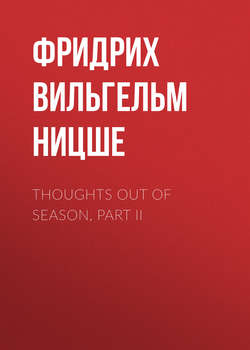Читать книгу Thoughts Out of Season, Part II - Фридрих Вильгельм Ницше - Страница 8
THE USE AND ABUSE OF HISTORY.
VI
ОглавлениеBut leaving these weaklings, let us turn rather to a point of strength for which the modern man is famous. Let us ask the painful question whether he has the right in virtue of his historical “objectivity” to call himself strong and just in a higher degree than the man of another age. Is it true that this objectivity has its source in a heightened sense of the need for justice? Or, being really an effect of quite other causes, does it only have the appearance of coming from justice, and really lead to an unhealthy prejudice in favour of the modern man? Socrates thought it near madness to imagine one possessed a virtue without really possessing it. Such imagination has certainly more danger in it than the contrary madness of a positive vice. For of this there is still a cure; but the other makes a man or a time daily worse, and therefore more unjust.
No one has a higher claim to our reverence than the man with the feeling and the strength for justice. For the highest and rarest virtues unite and are lost in it, as an unfathomable sea absorbs the streams that flow from every side. The hand of the just man, who is called to sit in judgment, trembles no more when it holds the scales: he piles the weights inexorably against his own side, his eyes are not dimmed as the balance rises and falls, and his voice is neither hard nor broken when he pronounces the sentence. Were he a cold demon of knowledge, he would cast round him the icy atmosphere of an awful, superhuman majesty, that we should fear, not reverence. But he is a man, and has tried to rise from a careless doubt to a strong certainty, from gentle tolerance to the imperative “thou must”; from the rare virtue of magnanimity to the rarest, of justice. He has come to be like that demon without being more than a poor mortal at the outset; above all, he has to atone to himself for his humanity and tragically shatter his own nature on the rock of an impossible virtue. – All this places him on a lonely height as the most reverend example of the human race. For truth is his aim, not in the form of cold intellectual knowledge, but the truth of the judge who punishes according to law; not as the selfish possession of an individual, but the sacred authority that removes the boundary stones from all selfish possessions; truth, in a word, as the tribunal of the world, and not as the chance prey of a single hunter. The search for truth is often thoughtlessly praised: but it only has anything great in it if the seeker have the sincere unconditional will for justice. Its roots are in justice alone: but a whole crowd of different motives may combine in the search for it, that have nothing to do with truth at all; curiosity, for example, or dread of ennui, envy, vanity, or amusement. Thus the world seems to be full of men who “serve truth”: and yet the virtue of justice is seldom present, more seldom known, and almost always mortally hated. On the other hand a throng of sham virtues has entered in at all times with pomp and honour.
Few in truth serve truth, as only few have the pure will for justice; and very few even of these have the strength to be just. The will alone is not enough: the impulse to justice without the power of judgment has been the cause of the greatest suffering to men. And thus the common good could require nothing better than for the seed of this power to be strewn as widely as possible, that the fanatic may be distinguished from the true judge, and the blind desire from the conscious power. But there are no means of planting a power of judgment: and so when one speaks to men of truth and justice, they will be ever troubled by the doubt whether it be the fanatic or the judge who is speaking to them. And they must be pardoned for always treating the “servants of truth” with special kindness, who possess neither the will nor the power to judge and have set before them the task of finding “pure knowledge without reference to consequences,” knowledge, in plain terms, that comes to nothing. There are very many truths which are unimportant; problems that require no struggle to solve, to say nothing of sacrifice. And in this safe realm of indifference a man may very successfully become a “cold demon of knowledge.” And yet – if we find whole regiments of learned inquirers being turned to such demons in some age specially favourable to them, it is always unfortunately possible that the age is lacking in a great and strong sense of justice, the noblest spring of the so-called impulse to truth.
